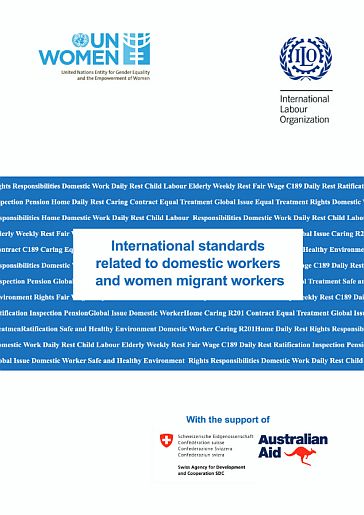Publications on Collective bargaining and labour relations
2015
-
Country Baselines
2015 Annual Review under the follow-up to the ILO 1998 Declaration - Compilation 2000-2015
04 November 2015
-
Publication
Enhancing collective bargaining and amicable settlement of labour dispute mechanisms (Final Evaluation Summary)
23 June 2015
Project: SBU/12/02/RUS - Evaluation Consultants: Marija Nashokovska (team leader), Glajina Ognajanov and Mihaela Vidaicu
-

Publication
International standards related to domestic workers and women migrant workers
01 June 2015
The GMS TRIANGLE project in Cambodia is collaborating with UNWOMEN to work with MOLVT towards ratification of ILO Convention 189 and Recommendation 201 on Domestic Workers. Two initial technical working group meetings have been held with tripartite constituent participation on 5 February and 30 March, both times followed by wider consultation workshops on 25-26 February and 12 May. During these initial consultations, all stakeholders including MOLVT voiced their support to ratification. All partners are currently working to approve a roadmap to ratification by the end of 2015.
-
Publication
Promoting social dialogue and enhancing labour governance in Tunisia (Final evaluation Summary)
21 April 2015
Project: TUN/12/01/NOR - Evaluation Consultant: Martin Herbert
-

An explanatory brochure
Promoting collective bargaining (C154 & R163)
09 April 2015
-
International Labour Review, Vol. 154 (2015), No. 1
Shrinking collective bargaining coverage, increasing income inequality: A comparison of five EU countries
07 April 2015
Wage-setting institutions can play a crucial part in containing the socio-economically destabilizing growth of income inequality. Using an analytical framework that distinguishes between protective and participative standards, the author examines their respective effects on the incidence of low-paid employment and income inequality under the wage-setting systems of Belgium, France, Germany, Sweden and the United Kingdom. His comparative focus on the interplay of statutory minimum wages and collective wage bargaining shows that while the latter is more effective than the former at reducing inequality, both require state intervention, with particular emphasis on participative standards to counter the erosion of industrial relations institutions.
2014
-
Publication
Outcome 10 independent evaluation: Workers have strong, independent and representative organizations - Trade unions for social justice (Evaluation summary)
19 November 2014
Projects: GLO/11/57/SID, GLO/12/58/NOR and GLO/12/59/NOR - Evaluation Consultant: Sterling Smith
-

Publication
Rules of the Game: a brief introduction to International Labour Standards (Revised edition 2014)
06 November 2014
Aimed at a non-specialist audience, this revised publication provides an introduction to international labour standards and discusses their importance in today’s global economy, the subjects they cover, how they are applied and supervised, and where further information can be sought.
-
Publication
Handbook: Guidance on implementing the Maritime Labour Convention, 2006 - Model National Provisions [2nd impression (with modifications), 2014]
03 November 2014
This handbook contains a model for legal provisions that implement the Maritime Labour Convention, 2006 (MLC, 2006). This model closely follows the provisions of the Convention. It is not a proposal for a national law (although with some adjustments it could be used as such), but, rather, it is intended as an aid, in whole or in part, for national legislators and legislative counsel in drafting the necessary legal texts to implement the MLC, 2006.
-

Publication
Non-standard work arrangements in the public sector: the case of South Africa
29 September 2014
This study is one of a series of country studies commissioned by the International Labour Organisation (ILO) on non-standard work arrangements in the public sector. Its aim is to understand, firstly, the implications of this trend for the decent work objectives and, secondly, to identify appropriate policy responses. In doing so, we have also endeavoured to identify the gender dimension of non-standard work arrangements, and obtain data that is disaggregated by sex.